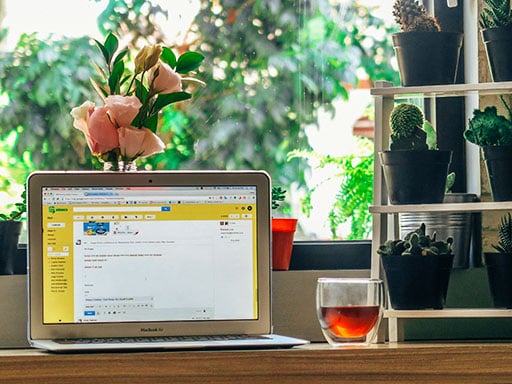How to study at home effectively (and not get distracted)
20 February 2025 | By: Amy Cousins | 2 min read
The road to successfully studying from home is paved with good intentions. It’s all too easy to get distracted, start playing on your Xbox, or scrolling through your social media feed - leaving your assignment or revision to gather dust.
So, how can you stay focused and really smash out those home study sessions? Here are 10 tips on how to study at home effectively.
Contents:
- Look after yourself
- Set targets
- Create a dedicated study space
- Make your study area your own
- Study at the right time
- Create your own timetable
- Take regular breaks
- Put your phone away
- Stay positive
- Remember to relax
1. Look after yourself
You’ll feel more motivated if you look after yourself. Set a time to wake up, eat your breakfast and get dressed, so you don’t spend the day in your pyjamas. Create a routine that starts your study session positively and gets you into the right headspace to learn.
2. Set targets
If you really think you can’t study at home effectively, try setting some achievable goals. To-do lists can help you prioritise and it’s a great feeling when you can tick off a completed project or reach a study goal. Decide how long you need to study each day and have a clear cut-off point – this will help you focus on what you need to achieve in the time available.
3. Create a dedicated study space
Whether it’s the kitchen table or a desk in your bedroom, try to create a dedicated study space. If you’re working in your bedroom, allocate a separate area for studying and one for relaxing, and don’t be tempted to work from your bed – you will want to snuggle down for a quick nap! It’s also a good idea to tell your family when you’re studying so you’re not interrupted.

4. Make your study area your own
If you’re lucky enough to have your own study space, personalise it. Keep everything you need, such as books, stationery and your laptop, to hand and keep the space organised and clutter-free. Put up posters and photographs, but make sure you decorate to motivate, not to distract. Think about noise levels, too – some people study in silence, others need a little background noise, so you’ll have to figure out what works best for you.
5. Study at the right time
If keeping school or college hours doesn’t work for you, don’t worry. We all have different times of the day when we’re more focused, so identify when you feel most productive and settle down to studying then – you’ll be more alert, ready to learn and able to process and retain information better.
6. Create your own timetable
Stay in control of your workload, particularly if you’re studying multiple subjects, with a timetable. Study for one or two hours at a stretch and when the time’s up, take a break to reward yourself. Use the clock or timer feature on your laptop or phone to focus on what you need to achieve in an allotted time, or if you’re preparing for a timed exam.
7. Take regular breaks

Build regular breaks into your study sessions and step away from that laptop. If you’re tired and frustrated, you’ll be less productive; regular breaks keep your mind fresh and make studying less of a chore. Make sure you get away from your study space, too, so you can go back to it with a clear head.
8. Put your phone away
Switching your phone off is hard to do, but you need to concentrate. If you can, leave your phone in a different room; if you can’t, put it in airplane mode and avoid checking your messages while you study.
9. Stay positive
Stay positive when you’re studying at home and don’t be put off by the amount of work you think you’ve got to get through. If a study session doesn’t go to plan and you get distracted, don’t panic – focus on what you’re achieving; you’re doing a great job.
10. Remember to relax
At the end of the day, pack up your study materials and shut down your laptop – you’ve worked hard and it’s important to switch off so you’re not constantly in ‘study mode’. Now’s the time to chill out, watch TV, go for a walk, or catch up with friends – enjoy it!
Find out more:
- Get 5 tips for researching universities virtually
- Need revision advice? We asked our students...
- Find out how to prepare for university interviews

Discover the Newcastle experience: Our Undergraduate prospectus will guide you through our world-class degrees, the support you can benefit from, and our beautiful city-centre campus.
